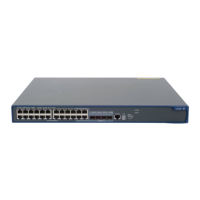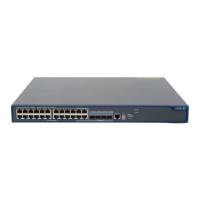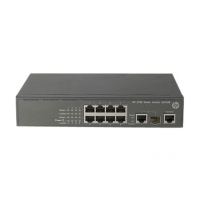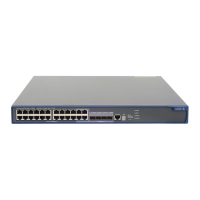30
• Garbage-collect timer—Specifies the interval from when the metric of a route becomes 16 to when
it is deleted from the routing table. RIP advertises the route with a metric of 16. If no update is
announced for that route before the garbage-collect timer expires, the route is deleted from the
routing table.
IMPORTANT:
To avoid unnecessary traffic or route flapping, configure identical RIP timer settings on RIP routers.
To configure RIP timers:
Ste
Command
Remarks
1. Enter system view.
system-view N/A
2. Enter RIP view.
rip [ process-id ] [ vpn-instance
vpn-instance-name ]
N/A
3. Configure RIP timers.
timers { garbage-collect
garbage-collect-value | suppress
suppress-value | timeout
timeout-value | update
update-value } *
By default:
• The garbage-collect timer is 120
seconds.
• The suppress timer is 120 seconds.
• The timeout timer is 180 seconds.
• The update timer is 30 seconds.
Configuring split horizon and poison reverse
The split horizon and poison reverse functions can prevent routing loops.
If both split horizon and poison reverse are configured, only the poison reverse function takes effect.
Enabling split horizon
Split horizon disables RIP from sending routes through the interface where the routes were learned to
prevent routing loops between adjacent routers.
To enable split horizon:
Ste
Command
Remarks
1. Enter system view.
system-view N/A
2. Enter interface view.
interface interface-type
interface-number
N/A
3. Enable split horizon.
rip split-horizon By default, split horizon is enabled.
Enabling poison reverse
Poison reverse allows RIP to send routes through the interface where the routes were learned, but the
metric of these routes is always set to 16 (unreachable) to avoid routing loops between neighbors.
To enable poison reverse:
Ste
Command
Remarks
1. Enter system view.
system-view N/A
